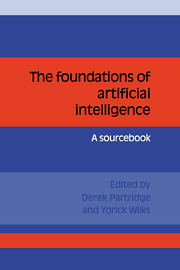Book contents
- Frontmatter
- Contents
- List of contributors
- Preface
- Acknowledgments
- 1 Introduction
- 2 The formal foundations of AI
- 3 Levels of theory
- 4 Programs and theories
- 5 The role of representations
- 6 The role of programs in AI
- 7 Rational reconstruction as an AI methodology
- 8 Is AI special in regard to its methodology?
- 9 Does connectionism provide a new paradigm for AI?
- 10 The role of correctness in AI
- 11 Limitations on current AI technology
- 12 Annotated bibliography on the foundations of AI
- Index of names
5 - The role of representations
Published online by Cambridge University Press: 03 May 2010
- Frontmatter
- Contents
- List of contributors
- Preface
- Acknowledgments
- 1 Introduction
- 2 The formal foundations of AI
- 3 Levels of theory
- 4 Programs and theories
- 5 The role of representations
- 6 The role of programs in AI
- 7 Rational reconstruction as an AI methodology
- 8 Is AI special in regard to its methodology?
- 9 Does connectionism provide a new paradigm for AI?
- 10 The role of correctness in AI
- 11 Limitations on current AI technology
- 12 Annotated bibliography on the foundations of AI
- Index of names
Summary
This section is the least concerned with concrete methodological issues, but there is, we believe, a need to explore some of the arguments concerning the abstract representations that underlie programs and theories in AI. Several other collections of philosophically-oriented AI papers address these issues quite well, and these are covered in the annotated bibliography. Nevertheless, there are a number of arguments that are either new, or will contribute significantly to the unity of this particular collection.
Winograd addresses, at a very general level, the promises and problems of AI: he is no longer as optimistic as he used to be. He briefly reviews the physical symbol system hypothesis (PSSH, see Newell, 1980) which is typically taken as one of the foundation stones of AI. Winograd then singles out for attack the essential sub-component, representation – “complete and systematic representation is crucial to the paradigm.”
He claims that an underlying philosophy of “patchwork rationalism” is responsible for the unwarranted optimism that pervades much of AI. And he briefly introduces an alternative basis – “hermeneutic constructivism.”
He examines three types of problem that arise from the misguided foundations of AI: gaps of anticipation, blindness of representation, and restriction of the domain. He sees the PSSH as leading AI into the necessity for decontextualized meaning – i.e. AI systems are constructed with rules that “deal only with the symbols, not their interpretation.” We are forced to deal with the representation as an object “stripped of open-ended ambiguities and shadings.” Only a very limited form of AI can be constructed on this basis, Winograd claims.
- Type
- Chapter
- Information
- The Foundations of Artificial IntelligenceA Sourcebook, pp. 165 - 166Publisher: Cambridge University PressPrint publication year: 1990



